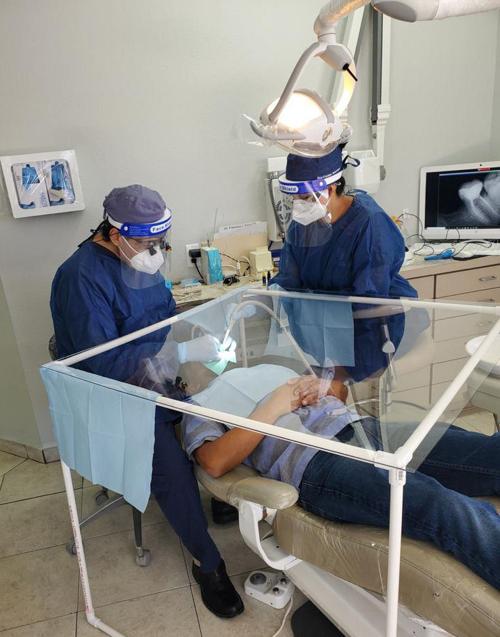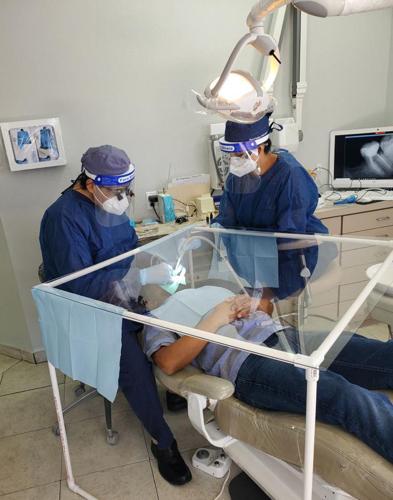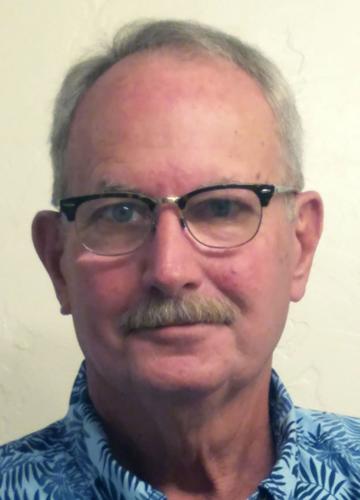Medical tourism in Nogales, Sonora — a mainstay of the border economy — has declined sharply since the start of the coronavirus pandemic as U.S. residents delay medical expenditures and avoid cross-border travel.
Dentists report that they’re seeing one-fifth to one-quarter of their normal patient loads, partly due to fewer patients and partly because they are scheduling fewer appointments to ensure they have time to thoroughly disinfect their offices between patients.
“We work in the mornings only, with very few patients,” said Dr. Gabriel Tardáguila, a periodontist in Nogales, Sonora. About three-quarters of his patients are from north of the border, lured south by much lower prices for exams and procedures. “We don’t want to work as much as we were doing, or put any patient at risk.”
Pharmacies that rely on cross-border clients also have experienced a drop in business due to reduced border traffic, said Lupita Freyde, owner of Farmacia Economica, near the U.S.-Mexico border.
People are also reading…
Her business experienced an almost 70% drop in U.S. clients since the pandemic began, declining from about 150 to 50 American customers per week, she said.
Tardáguila said he’s only booking around two patients a day, compared to 12 a day pre-coronavirus. But some practices are seeing less of a reduction in business, he said.
“Root-canal specialists are having a lot of work, because pain is involved,” he said. “Patients are going to get treated for them” despite the pandemic.
Dentistry is a high-risk field even without a health crisis, and dentists are accustomed to protecting against infectious diseases like hepatitis, HIV and tuberculosis, said Dr. Jose Saturno, owner of Border Dental, a few blocks south of the Nogales, Sonora, port of entry.
“COVID-19 is not the only (contagion) we’re asked to deal with, but it’s the most important one now,” Saturno said. He’s not doing any cosmetic work these days, only essential care, such as bone grafts for dental implants, and repairing broken teeth, dentures and crowns. Almost all of his patients are Americans, said Saturno, who lives in Nogales, Arizona, and commutes across the border to work.
HEALTH PROTOCOLs
Like many others, Dr. Javier Tapia in Nogales, Sonora, said he temporarily closed his dental practice when the pandemic started, taking time to devise a safe approach to patient interactions. He attended webinars on COVID-19 safety, bought disposable gowns for his staff and disposable shoes for patients, and got infrared thermometers to check temperatures.
His patients, three-quarters of them from the U.S., are asked to put on the booties and immediately wash their hands when they arrive. He removed magazines from his waiting room and he schedules just one patient in the office at a time, with a maximum of three to four patients a day, compared to the usual 12 to 14. His staff all use masks, as well as a clear shield mounted above patients as dentists work.
The precautions are crucial, but they affect the warm dynamic he usually has with his patients, he said.
“It’s not as fun anymore,” he said. “Before, you have the contact with the patients, you can shake hands and talk face to face. … It’s a little more stressful. The practice is not the same, but we have to keep working.”
Tucson attorney Robert Fee, 65, has visited Tapia’s office twice since the pandemic started, to get a crown replacement. Fee said he felt comfortable with Tapia’s extensive COVID-19 health protocols.

American patient found Nogales to be “ghost town”
“It was very clear they were taking it quite seriously,” he said. “I’d like to see more businesses in the States following protocols that they’re following down there in Mexico.”
His first visit to Tapia was three years ago, to get a dental implant replaced at less than one-third of the cost it would be in the U.S. But cost wasn’t the sole factor in Fee’s decision to travel south for care; a friend who runs a dental lab in Catalina recommended Tapia for his quality of care, Fee said.
Other dentists reported similar COVID-19 protocols. Dentist Jose Carlos Otero of Dental Laser Nogales, where nearly all the patients are American, said among many safety measures, patients’ shoes and belongings are disinfected when they arrive, and patients are asked to come alone, if possible. He said Dental Laser has seen only a 40% decrease in patients since the pandemic started.
At Laser Tech Medical Spa, treatment rooms are completely sterilized between patients, like normal, but now the bathrooms and waiting room are also disinfected regularly throughout the day, said Dr. Francisco Vazquez, whose practice was started by his father 60 years ago. Some of his patients are the great-grandchildren of his father’s patients, he said.
“We want our patients to trust in us,” he said.
PHARMACIES
Nogales pharmacist Aris Ledezma said the bulk of the clients at his 18-year-old pharmacy are locals, since he’s located farther from the U.S. border than other pharmacies.
But he’s seen a small increase in visitors from Arizona, who are seeking drugs like hydroxychloroquine to prevent or treat COVID-19. Hydroxychloroquine is unproven as an effective treatment for COVID-19, but President Trump has touted its potential.
Ledezma said he doesn’t sell hydroxychloroquine, because he doesn’t want to contribute to a shortage that harms patients who truly rely on the drug.
“It’s a product that is used by lupus and rheumatoid arthritis patients, and those people really need it,” he said.
Pharmacist Freyde says she won’t sell hydroxychloroquine without a legitimate prescription, although she said some other Nogales pharmacies are more lenient in that regard. Patients are asking for hydroxychloroquine because they’ve seen it on TV, she said — not because a doctor recommended it.
“It is worrying, because you shouldn’t self-medicate,” she said.
Ledezma, an avid runner, said he was diagnosed with COVID-19 in late May. The condition was “severe,” he said. His oxygen level dropped dangerously low and he got pneumonia. He received intravenous antibiotics and blood thinners, he said.
“COVID is very different from all the influenzas of the past,” he said.
Treatment delays become emergencies
Facing high dental-care costs in the United States, an estimated 900,000 Americans annually seek dental care in border towns like Nogales, making up the bulk of the 1.4 million who travel to Mexico each year for medical care, said Josef Woodman, CEO of North-Carolina-based Patients Beyond Borders, which publishes an extensive medical tourism guidebook and provides consulting services to international health-care providers and other organizations. One of his research partners is medical tourism booking agency Medical Departures, which has a sister site called Dental Departures.
Medical tourism declined precipitously at the start of the pandemic, but Dental Departures recorded a recent spike in bookings and spending in Mexico, Woodman said. While dental bookings in Mexico were still lower in June 2020 compared to June 2019, spending for the month was higher than the previous year, Woodman said.
Tha suggests Americans are now traveling to Mexico mainly for complex care, like implants, to treat problems that have become impossible to ignore, he said.
“People put it off, then five months later it turns into an emergency situation,” he said. “The ones that were in trouble in December are desperate.”
Patients with dental needs shouldn’t wait for severe pain to get treatment. Even simple problems, like a cavity requiring a filling, can escalate into something that requires a more costly and invasive procedure, like a root canal or dental implant. Tooth infections can be life-threatening, and severe tooth pain can necessitate a hospital visit, dentists say.
To ensure they’re getting good care, Americans seeking care in Mexico should research carefully to ensure they’re going to a reputable provider — especially now, when dedicated sanitation protocols are crucial, said Martha Gonzalez, CEO of Warburg Way Medical in Nogales, Sonora. The medical practice, which provides palliative cancer treatments, is co-located with her husband Dr. Francisco Vazquez’s dental practice, Laser Tech.
Patient visits are down about 80% at both practices due to the pandemic, Gonzalez said.
“If people are only interested in price, they might not get the quality they should,” she said.
Woodman agrees. He’s heard some horror stories of procedures gone wrong abroad, particularly in the cosmetic and bariatric surgery fields. But there are plenty of top-notch doctors and hospitals abroad, including many clinicians who trained in the U.S.
“Patients who do their homework are far more likely to experience a rewarding clinical outcome,” he said.
Wait times Have eased at border
Nogales dentists say that wait times at the border have improved significantly in recent weeks, with patients reporting little to no wait time returning to the U.S.
But earlier in the pandemic, patients were waiting for hours — in one case, nine hours, Saturno said — at the Nogales pedestrian crossing. At times, U.S. Customs and Border Protection was only manning a single lane to process border crossers.
U.S. Bureau of Transportation Statistics data show border crossings at the Nogales port of entry declined after the U.S. implemented restrictions on nonessential northbound travel on March 21. (The bureau does not track outgoing border crossings into Mexico.)
Between February and May, pedestrian crossings in Nogales fell 71%, from about 249,000 in February to 71,000 in May.
Personal vehicle crossings dropped by 61% in the same period.
Sonora, Mexico implemented its own restrictions on nonessential border traffic on July 4, limiting southbound travel to essential activities, which includes acquiring medicine and medical care. (The governor’s office made an exception for travelers heading to Rocky Point who showed proof of a reservation at a hotel or resort certified in proper COVID-19 protocol.)
Those immigration checkpoints are no longer in place but could return at any time, Juan Francisco Gim, director of Mexican Customs in Nogales, Sonora, said last week. Travelers are still advised not to cross into Mexico unless they have essential business, he said.
When crossing the border, dental patients should bring proof that they have an appointment in Nogales, Sonora, in case they are questioned by immigration officials at the border, said Woodman, who said he hasn’t heard of anyone being turned away when seeking medical care across the border.
“Next to no one on the streets”
Fee, the Tucson resident who recently visited a dentist in Nogales, Sonora, said the city looked like “a ghost town” compared to previous visits. It seemed like everyone he saw was wearing a mask, he said.
“There’s next to no one on the streets,” he said. “It’s really sad right now with the number of businesses and restaurants that have had to close up.”
Saturno of Border Dental said he thinks the pandemic and related financial crisis will get worse before getting better. He was shocked to see a July 8 New York Times report showing that during a recent seven-day period, no country in the world had as many new confirmed COVID-19 cases per million residents as the state of Arizona.
“It was hard to digest,” he said. Saturno said he’s frustrated to see people continuing to go to barbecues and failing to practice social distancing.
“I don’t have meetings with anybody right now, just my family. The only risk I take is work,” he said. “For me, it’s mostly psychological strain — every day thinking about it, every day hearing there’s people you know that die or get sick.”
The Mexican government has provided little financial support to businesses and individuals, making it difficult to follow health officials’ orders to quedate en casa, or stay at home, said Juan Ruiz, vice president of Canaco Nogales, the chamber of commerce in Nogales, Sonora.
Instead, many must risk their health by continuing to work so their family can survive, he said.
He hopes tourists will limit their travel to essential activities in Mexico. Though businesses like border dentists rely on the support of Americans, too many people are crossing the border for nonessential reasons, like beach vacations or family visits, potentially bringing COVID-19 with them, Ruiz said.











